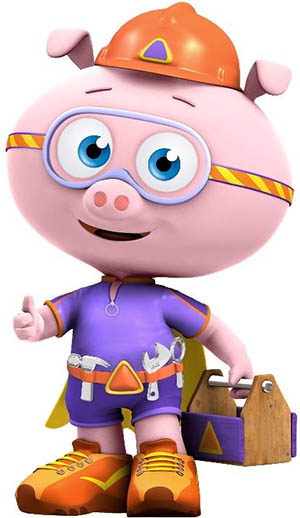

Happily Mother Goose adds this part of her story into the book and happily cheers her mouse friend. Princess Presto then writes the word "C-L-O-C-K" with the viewer in order to make a clock appear! Mother Goose tries, but fails and Princess Presto decides she'll find the right word. Mother Goose realizes this isn't right, and Red suggest she needs a word sounding like Dock. Hickery Dickery dock, the mouse ran up the Elephant. Mother Goose asks a mouse to help her with her next poem. He then flies to the others to see them now at a mouse hole.

As the group leaves, the super letters H, and E are found and Super Why adds them into his Super Duper Computer.

So Alpha Pig then sings his song before finding the letters G, and O, to spell GO, in hopes of making the Lamb follow behind Mary. She then figures out that the word should be "go". She begins to write once more, ending with "The lamb was sure to.juggle potatoes!" She realizes this doesn't sound right, then asks Super You what word sounds like "Snow". Mother Goose panics upon noticed her glasses are missing, only to find them on top of her head. So Whyatt continues to read "Mother Goose's story did not sound right." Red then comments on how they are in the same situation and they quickly head over to see her. She began to write her first story." She then began to explain her first story, then realizes it sounds wrong. "Mother Goose wanted to write a book of stories. Whyatt then begins to read a few sentences. The group land at a very colorful land with the trees resembling odd colorful flowers, colorful egg plants, and odd characters that run about. They then transform into the Super Readers before flying off into the book. Inside Whyatt loads the super computer and Red explains her problem of not being able to think up the right words before Princess Pea then proceeds to use her magic and find the book they need to enter, "The Story of Mother Goose".Īnd so, Whyatt loads the super letters to see that they need a total of five super letters. Whyatt calls the other three and the group head over to the book club in order to discuss this new problem. With some talk, Red informs him that she wishes to write a song but she's struggling to think up the right words to rhyme with each line. The episode begins as Whyatt gets a call from Red and rushes to her home to see she is struggling with something. And in England, circa 1765, John Newbery published the wildly popular “Mother Goose’s Melody, or, Sonnets for the Cradle,” which indelibly shifted the association of Mother Goose from folktales to nursery rhymes and children’s poetry, and which influenced nearly every subsequent Mother Goose publication.Red is writing a new song, but she gets stuck because she simply can't think of the right word! To help her out, Super Why and his friends meet rhyming royalty - Mother Goose - just as she's starting to pen her legendary poems. In 1697, Charles Perrault published a collection of folktales with the subtitle “Contes de ma mère l’oye” (Tales from my Mother Goose), which became beloved throughout France and was translated into English in 1729. In fact, the etymology of the moniker “Mother Goose” may have evolved over centuries, originating as early as the 8th century with Bertrada II of Laon (mother of Charlemagne, the first emperor of the Holy Roman Empire) who was a patroness of children known as “Goose-foot Bertha” or “Queen Goosefoot” due to a malformation of her foot.īy the mid-17th century, “mere l’oye” or “mere oye” (Mother Goose) was a phrase commonly used in France to describe a woman who captivated children with delightful tales.


 0 kommentar(er)
0 kommentar(er)
